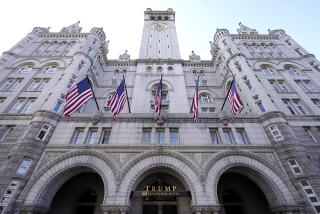Energy Chief Apologizes for Wasteful Spending on Trips
- Share via
WASHINGTON — By turns contrite and combative, Energy Secretary Hazel O’Leary repeatedly apologized Thursday for mismanagement and wasteful spending on four costly foreign trade missions that she led but insisted that the trips advanced important national interests.
“I will always regret that we fell short . . . of the American public’s expectations of how they should have been conducted,” O’Leary said of the missions during more than three hours of testimony before the House Commerce subcommittee on oversight and investigations. “I apologize for every misstep, every misspent dollar.”
Republican lawmakers emphasized violations of federal regulations and, possibly, law disclosed in a recently released draft report by Energy Inspector General John C. Layton. And, they said, O’Leary continued to travel abroad despite an admonition by Layton that she not do so until shortcomings in administering overseas trips that he had identified in 1994 were corrected.
“These are examples of management failure, indifference to cost and disregard for ordinary taxpayers,” said subcommittee Chairman Joe L. Barton (R-Texas), who has conducted a series of hearings on O’Leary’s travels. “A disturbing pattern of behavior at the department appears to be that nothing gets fixed until it becomes a public relations nightmare.”
O’Leary strongly disputed Barton’s assertion that she had failed to heed Layton’s initial recommended management changes in 1994. Although the modifications were not formally adopted, she said that she had taken immediate steps to implement them before she embarked on previously scheduled overseas trips--including two trade missions.
More recently, O’Leary said that 10 of the 29 reforms that Layton recommended in his May report had been incorporated and that the rest would be implemented by July 31.
In his six-month inquiry, Layton found that the department footed the bill on trips for some private participants who should have paid their own way, failed to collect money owed by others and used an account that lacked sufficient funds to pay for receptions in South Africa and China.
O’Leary took 16 overseas trips during her first three years in office at a cost of $4.57 million. The trade missions to India, Pakistan, China and South Africa, each involving as many as 114 private and governmental participants, cost a total of $3.42 million.
O’Leary said that “each of the trade missions advanced national energy, economic and security priorities,” which has been obscured by the furor over their cost. Business participants extolled the value of the trips at appearances before the panel Wednesday.
“There’s tremendous benefit that can be accrued from these missions, if they are done properly,” Barton agreed.
Republican lawmakers sparred with O’Leary and deputy Energy Counsel Eric Figy over Layton’s assertion that the department may have violated a law that prohibits a government employee from overspending money in an appropriated account.
Barton said that Layton’s report indicated that civil, if not criminal, violations of the law had occurred.
O’Leary said that she disagreed with that assessment and that the Energy Department was reviewing the matter. Department officials have maintained that costs for receptions on the trips should have been paid from nongovernment sources, such as a foundation in South Africa, or with funds collected from private business participants for such purposes.
O’Leary acknowledged that she and some other Energy Department employees had unknowingly violated government-wide and department regulations by taking full reimbursement for their per diem costs for food and incidental expenses, even though some of their meals had been provided at official functions.
Federal workers are required to deduct expenses from their per diem if a meal is paid for by the government. Energy employees must do so if they do not pick up the tab themselves.
O’Leary said that she had reimbursed the department $365 for such meals on the trips and that all travel participants had been told to repay any money that they owed. Layton found that only one of 223 trade mission participants reviewed had subtracted the value of these meals from their per diem reimbursement.
At times, O’Leary suggested to the panel that she was being unfairly vilified. She said the “word on the street” was that “some in Congress wanted to take me out by Christmas.” Barton denied that the panel was engaged in “a personal witch hunt.”
More to Read
Get the L.A. Times Politics newsletter
Deeply reported insights into legislation, politics and policy from Sacramento, Washington and beyond. In your inbox twice per week.
You may occasionally receive promotional content from the Los Angeles Times.









